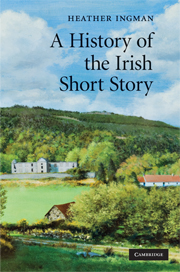Book contents
- Frontmatter
- Contents
- Acknowledgments
- 1 Introduction
- 2 The nineteenth century: nation and short story in the making
- 3 Fin de siècle visions: Irish short fiction at the turn of the century
- 4 The modern Irish short story: Moore and Joyce
- 5 1920–1939: years of transition
- 6 1940–1959: isolation
- 7 1960–1979: time, memory and imagination
- 8 1980 to the present: changing identities
- Notes
- Biographic glossary
- Bibliographic essay
- Index
7 - 1960–1979: time, memory and imagination
Readings: William Trevor and Edna O’Brien
Published online by Cambridge University Press: 04 August 2010
- Frontmatter
- Contents
- Acknowledgments
- 1 Introduction
- 2 The nineteenth century: nation and short story in the making
- 3 Fin de siècle visions: Irish short fiction at the turn of the century
- 4 The modern Irish short story: Moore and Joyce
- 5 1920–1939: years of transition
- 6 1940–1959: isolation
- 7 1960–1979: time, memory and imagination
- 8 1980 to the present: changing identities
- Notes
- Biographic glossary
- Bibliographic essay
- Index
Summary
‘If it weren't for the New Yorker I couldn't live,’ said Brian Friel in an interview in 1965, acknowledging that magazine's crucial role in enabling him to pursue a full-time career as a writer. Given the limited markets available in Ireland, the New Yorker continued to be an important outlet for Irish writers, publishing work by, among others, Maeve Brennan, Benedict Kiely, William Trevor and Edna O'Brien. At the same time, more favourable economic circumstances in Ireland gave a boost to indigenous publishing. Seán Lemass's election as Taoiseach in 1959 and his implementation of the programme for economic development drafted by T. K. Whitaker to give priority to export industries and open up Ireland to foreign investors, fostered a general air of renewal and self-confidence in the country and turned the tide of emigration. New presses started up, among them Poolbeg, founded in 1976. The growth of bookshops, summer schools and a number of often short-lived literary magazines provided Irish writers with an opportunity to showcase their work. A particular impetus for young and emergent short story writers in Ireland came with the decision of the Irish Press in 1968 to devote a weekly page to new Irish writing. The literary editor at the time was David Marcus, and from this date onwards the promotion of new and high quality short story writing in Ireland owes much to his encouragement.
- Type
- Chapter
- Information
- A History of the Irish Short Story , pp. 190 - 224Publisher: Cambridge University PressPrint publication year: 2009



